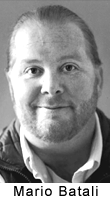Subtract Three Ingredients: A Night with Batali, Bourdain, and Buford
“So why did you write this book?” Bourdain began, gulping from a green bottle of beer. On Mount Olympus we gathered, two gods of the (celebrity) cooking universe and the scribe who got to tag along, having a casual conversation over beers in front of a packed audience at the New York Public library, at 42nd st. and 5th ave. It was billed as discussion of "kitchen secrets" as revealed in Bill Bufords new book Heat in which he becomes a " Kitchen Slave, Line Cook, Pasta-Maker, and Apprentice to a Dante-Quoting Butcher in Tuscany ." With Anthony moderating (so as to keep the whole thing from becoming “all about Mario”), Buford seemed ready to pounce on every opportunity to tell the remarkable story. His eyes glistened when he described the first encounter with Mario Batali, when he decided, against his wife’s better judgment, to invite the celebrity chef to their home for a meal (Batali showed up with a hunk of lard, wine, and the gall to tell Buford he was an idiot for wrapping the roast in tin foil after it came out of the oven.) But Bourdain, god bless him, had other things in mind, and the evening quickly changed courses to exploration of celebrity, why Rachel Ray is the "devil" (Bourdain), and how many restaurants Mario can open before he retires to his own desert island in a speedo.
 For those who don't know, Bourdain is a badass, and was the one that looked most natural in the environment. Instead of the usual ice water on stage, the three sipped on beers. Batali picked his up and seemed to consume it one large gulp at a time. Buford nervously sipped, looking like his was worried that he couldn't keep up with the two giants. Bourdain just sucked back on his like it was the most natural thing in the world to be drinking in front of a large audience and talking about yourself.
For those who don't know, Bourdain is a badass, and was the one that looked most natural in the environment. Instead of the usual ice water on stage, the three sipped on beers. Batali picked his up and seemed to consume it one large gulp at a time. Buford nervously sipped, looking like his was worried that he couldn't keep up with the two giants. Bourdain just sucked back on his like it was the most natural thing in the world to be drinking in front of a large audience and talking about yourself.
Buford looked too excited about where he was, and it became difficult to connect his writing to his persona. This is a man who followed football hooligans in England, chronicled in his extraordinary Among the Thugs , worked in one of the most physically challenging kitchens in New York, and lived with a butcher in the Tuscany cutting up whole hogs. But on stage he just looked timid and unsure and even ineloquent, but that could have been his juxtaposition to the two great chef personalities. He played up the "I'm stupid and mess up a lot but I'm really excited" routine, which is in fact the genius of his writing (he sacrifices his own dignity so that we all learn something, like why you never throw out the leaves from the top of celery--because it will cause a television star to go rooting into the garbage to retrieve them).
Though it was his party, the best moments came when Buford stayed on the sidelines and let Bourdain and Batali battle each other for witty remarks or blunt statements. Bourdain was the most entertaining, who admitted when asked why he no longer works consistently at his restaurant, Les Halles, that he’d rather be “bitching about the thread count of the Four Seasons in Singapore” than working 14-hour days at the sauté station. Batali, on the other hand, has more restaurants opening in Vegas and Los Angeles, all partnerships with chefs he handpicks and decides to grace with his name and celebrity to give their restaurants a kickstart.
The question/answer session was altogether more revealing--questions and answers like:
-
Are intense, screaming personalities a requirement for chefhood (generally yes, and those that aren't shouting are probably engaged in some other kind of psychological abuse in which a raised eyebrow is the difference between an employee crying themselves to sleep or not).
-
The American acceptance of sushi as something "okay to eat" was the tipping point towards explorations of the more off-putting aspects of Italian and French cuisines (like pure lard or pig's belly).
- Why aren't there more persons of varying ethnicities becoming chefs? (Batali was nearly silent, but Bourdain wondered aloud why the James Beard Foundation, which claims to appreciate all who work in the restaurant business, has events attended predominately by whites, yet his kitchen is four-fifths hispanic).
The night was short, fascinating, if not completely life changing. The biggest "secret" revealed was a simple philosophy: remove three ingredients from a dish, whenever possible. Then spend the saved money on better quality for those that remain.
Otherwise, no blowups or poignant moments. Just two of the greatest chefs in New York and one of the most interesting non-fiction writers of the last decade sharing a beer or two. The three left to go dine at some prestigious restaurant, to probably tell more grand stories there. But, of course, Bourdain left with the last word. After a lull in the Q and A, he admitted that this would have to be it because "I need to get out of here and smoke a cigarette."
Uncategorized


Comments:
Blog Comments powered by Disqus.